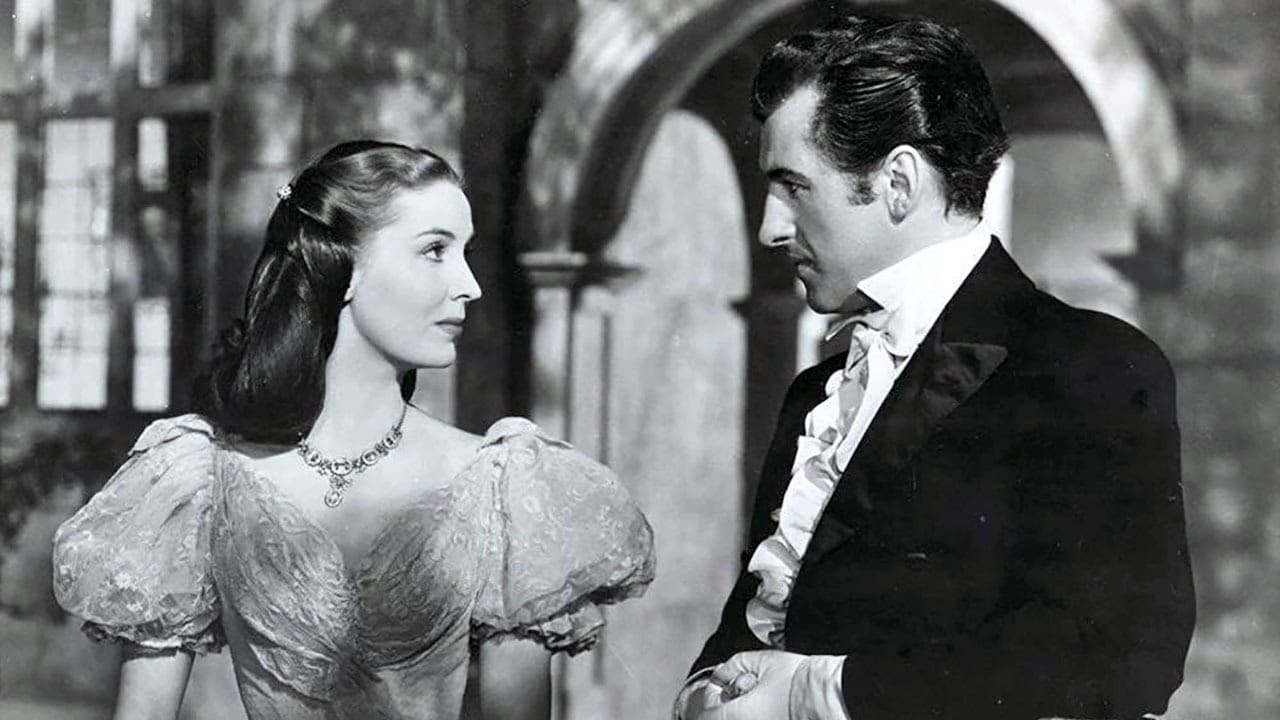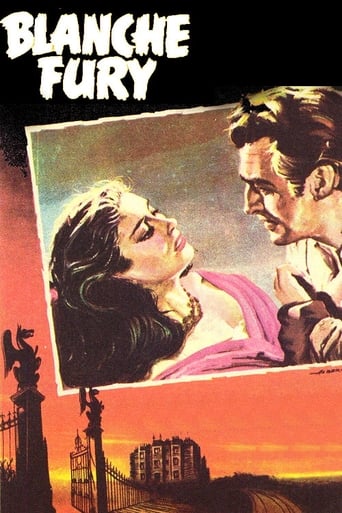

Stewart Granger was never satisfied with his parts, he felt like always having to play superficial stereotypical rogues or heroes with nothing in them but some dashing presence, but all his appearances are excellent and surprisingly reliable for being so 'superficial', and he is always better than he thought himself. Valerie Hobson, on the other hand, was never better and more beautiful than here. It's her film, and she fills it up to the brim with striking beauty and a character of constantly increasing interest as she develops, a brave woman of much hardship behind her and even more expecting her. It's a dramatic story of passion and forbidden love, social injustice and family feuds with a curse since 700 years to top it all, and it takes a very surprising turning as the plot thickens and suddenly jumps into a precarious course of no return. Staffordshire is in the midlands between Birmingham and Liverpool, and the whole setting is in the rural part with soft hills and plains and deals a lot with horses - some of the tragedies here involve horses.It's an efficient drama of love and destiny and how little man or woman can control it, but it is Valerie Hobson you always will remember from this film.
... View MoreI was expecting a cheap melodrama set in Victorian era, but instead this is a well-done, suspenseful movie concerning the struggle for ownership/inheritance of an estate, and a young woman who arrives as a poor relation and marries the heir.Valerie Hobson gives a strong performance as Blanche; once she is widowed (due to the machinations of her obsessed lover, Stewart Grainger as the illegitimate heir) she even looks different, older, strained, whereas she was all frills and glamor before. It is difficult to see Stewart as such a vindictive man, cruel to the end, and a surprise, as I figured he was only doing hero roles once he became a star, but maybe that was an American thing; this film is British.The ending does come as a surprise and shows that one can control even from the grave.
... View MoreAh, BLANCE FURY...it weaves me under it's spell with every fresh viewing. While it probably is just a load of "tosh", it sucks me right in, with it's period setting, gorgeous colour, Gypsies, murder, passion and betrayal. Sounds like a Gainsborough film, doesn't it? Surprisingly, it ain't. Blanche is much more muted in tone than the Gainsborough bodice-rippers (see the fun THE WICKED LADY), and that's probably why the film didn't set the box office alight for Cineguild as was expected. Yet it's an odd, haunting little film- the photography is absolutely beautiful and Hobson and Granger give excellent performances.The film begins with three startling shots of horses galloping towards Clare Hall, the setting for much of the film. A young woman (Hobson) is on her sickbed, delirious and being tended by a doctor and a servant. The film is told in flashback, with the viewer being transported into Hobson's thoughts with some clever photography. We learn of the life of Blanche Fury- poor governess (shades of JANE EYRE)who goes to live with her rich cousin (Michael Gough) and her uncle (Walter Fitzgerald), owners of Clare Hall. She is immediately drawn to the Heathcliff-like stable-boy, the brooding Phillip Thorn (Stewart Granger).It turns out Thorn is actually (yet it is not legally binding) the true heir to the Fury estate, for he is the illegitimate son of the previous owner's affair with an Italian woman (this gives Thorn an air of exoticism, much like the Gypsies). He is kept on the estate by Fitzgerald and Gough, yet treated no better than a dog. We learn that Thorn is obsessed with his lineage, and his life's ambition (and obsession) is to claim back Clare Hall. Hobson soon becomes the bride of Gough even though she doesn't love him. And then, on her wedding night, after Gypsies set Clare Hall's barns alight, she goes to the stables to find Granger. Still clothed in her wedding gown, they passionately kiss. And that's when the romantic passions ignite...To give away too much advance knowledge of the plot is to spoil the fun. It's what I would call a minor British Gothic masterpiece, dark, tense and quite atmospheric. BLANCHE FURY was reportedly Hobson's favourite of all her film roles, and Granger does some wonderful work too. Finally given a chance to play an anti-hero/villain (he was always cast as the romantic hero to Mason's devious villain in the Gainsboroigh costume films), his arrogantly attractive style suits the character. The guy could act, and he proves it here- in a powerful courtroom sequence towards the end of the picture Hobson and Granger share a long look, and their acting is more potent and poignant than words.
... View MoreI first discovered this little gem on tv a few years ago and loved it , i taped it and for some unknown reason kept watching it over and over it has a kind of hypnotic pull to i mean you have to really get into, i guess its not for everybody but it has been held in some regard up until recently,martin scorseses mentioned this as one of his guilty pleasures in film comment years ago and popular film presenter and critic from australia bill collins said while presenting another film that this would have to be one of the best british films from the forties.I totally agree it has a great gothic feel and the decor is marvelous as is the estate it was filmed on it has good solid performances and stewart granger is espescially good.Take note of the gypsy elements because at the time these points were crowd pullers other granger films to watch out for with similarities - "moonfleet","caravan","saraband for dead lovers","madonna of the seven moons"
... View More